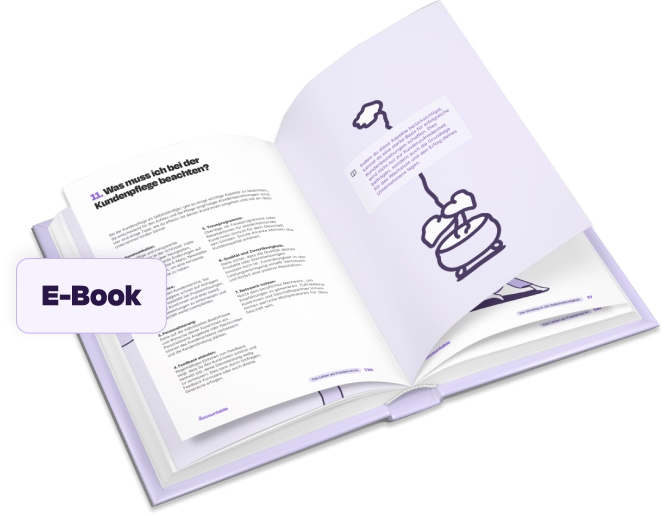When you are self-employed on a part-time basis, or you are just starting your own business, you may be able to register as a Kleinunternehmer (small business owner) in Germany.
This regulation saves a lot of paperwork and simplifies tax obligations. But when can you - and should you - actually make use of the Kleinunternehmer rule? Here you find everything about the limit for Kleinunternehmer.
You can use the Kleinunternehmer rule if your turnover (net revenue) did not exceed 25,000 € in the previous calendar year and is not expected to exceed 100,000 € in the current year.
Turnover means the amount you invoice before expenses but without VAT (net sales).
If you are starting your self-employment for the first time, only your expected turnover for the first year matters. As long as you will stay below 100,000 € in the year you start, you can choose the Kleinunternehmer rule.
There is no longer an automatic monthly prorating of the threshold when you start mid-year (a rule that applied under the old system). You simply must reasonably expect that your total turnover for the remaining months of the year will not exceed 100,000 €.
Example: If you become self-employed in June and want to make use of the Kleinunternehmerregelung, you simply need to ensure that your expected net turnover from June to December will not exceed 100,000 €.
There is no monthly prorating of the threshold anymore. Even if you only operate for part of the year, the full current-year limit of 100,000 € applies. As long as your total turnover for the remaining months of the year stays below this amount, you can choose the Kleinunternehmer rule.
Tip from Accountable💡: Even though the Kleinunternehmer rule has some advantages, it can also make sense not to apply for it. It could be more beneficial to voluntarily register as subject to VAT.
For example, if you register an expensive photovoltaic system. In this case you could get back the VAT, which is not a small amount.
The Kleinunternehmer rule is only relevant for revenue from your self-employment. If you also work as an employee, for example, the money you make with this job is not taken into account for the Kleinunternehmer rule.
So it doesn't matter how much you earn as an employee. But if you operate multiple self-employed activities, you must add all self-employment turnovers together. If the combined turnover exceeds 25,000 € in the previous year or will exceed 100,000 € in the current year, you cannot use the Kleinunternehmer rule.
Example: Let's say you are employed as teacher but also sell homemade jewelry through an online store on the side. In this case, you only need to consider the sales from the online store when wanting to register as Kleinunternehmer.
At the same time a self-employed craftsman who also runs an online store on the side has to add up his sales from both activities and calculate the total, if he is considering whether he can register as a Kleinunternehmer.
For example, if you have clients in other EU countries who fall under the Reverse Charge regulation, you don't have to take this into account for your turnover. Also, you don't have to include other tax-exempt income, e.g. medical treatment or some educational and teaching services, as well as income from renting out apartments.
If you notice that your revenue exceeds the turnover limit, you must change to the standard taxation and are subject to VAT. So it's important that you keep a close eye on your sales when you reach this limit. Because as soon as you exceed 25,000€, you're no longer a Kleinunternehmer. You'll have to charge VAT in your invoices starting from the next year and also pay it to the state.
Tip from Accountable💡: If you're a Kleinunternehmer but might exceed the limit, Accountable is there for you! The Accountable app shows you exactly what you've earned and notifies you when you're about to exceed the 25,000€ threshold!
20 Kapitel knallhart recherchiert und vom Steuerprofi geprüft
Kostenlos herunterladen

Author - Sophia Merzbach
Sophia has been a key member of the Accountable team for many years, bringing a unique blend of journalistic precision and in-depth tax expertise to her work.
Who is Sophia ?Thank you for your feedback!
Useful
How much income tax is deducted from your income is largely determined by your tax class. There are ...
Read moreWorking as a self-employed professional has many advantages: You are your own boss and you can choos...
Read moreWorking with international clients can be tricky, depending on where exactly they’re located, whet...
Read moreMir wurde sehr schnell und kompetent geholfen. Der Kontakt war super freundlich und zuvorkommend! Auch für eine weitere Rückfrage wurde sich mit viel Geduld die Zeit genommen, um mir den Sachverhalt detailliert zu erklären.
Christine Höhne
Die Erklärungen waren total plausibel und ich habe mich über die zeitnahe Antwort gefreut.
Lina Gertzmann
Ich bin immer sehr zufrieden mit euren Antworten, die auch immer innerhalb von 24 Stunden erfolgen.
Sandy Kratochwil
Der Umgangston ist super freundlich! Die Antworten kommen immer schnell und sind qualitativ echt gut und verständlich!
Benedikt Schönauer
Meine Erfahrungen mit Accountable sind bisher nur Positiv. Ich als Kleinunternehmer habe jetzt alles in einer App und es ist super easy zu handhaben. Meine Buchhaltung war noch nie so leicht. Ein mega Pluspunkt ist noch, dass man ein Kostenloses Geschäftskonto einrichten kann, welches direkt mit allen Buchhaltungsfunktionen verknüpft ist.
"Tim Friedrichs"
Mit Accountable habe ich meine Buchhaltung im Griff, kann easy meine Umsatzsteuervorauszahlungen einreichen und Rechnungen stellen. Die Steuer-Coaches helfen mir immer schnell, wenn ich mal eine Frage habe. Durch Accountable komme ich bisher locker ohne Steuerberater:in aus. Und wenn ich doch mal Bedarf habe, kann ich mir über Accountable ein/e Expert/in buchen. Alles in allem eine runde Sache. Ich habe Accountable schon oft weiterempfohlen. (Und ganz ehrlich, das Logo von Accountable ist ja wohl sowas von nice.)
Ute Mayer-Dohmen
immer bemüht alle Fragen und Probleme schnell zu klären.
Halil Ibrahim Baran
Arbeiten mit Accountable ist für mich sehr hilfreich und meinen Anliegen werden schnell bearbeitet. Eine der besten Entscheidungen die ich dieses Jahr getroffen haben.
"Hardy Thiele"
konkrete Antworten auf Fragen, gute Vorbereitung und Kommunikation untereinander, sehr gut!
Nils Ohlsen
Hallo Simon, bin Dankbar das ich Accountable benutzen darf. Ich brauche aber Bitte eine Antwort auf mein Anfragen ùber die Steuercoaches, dies dauert zu Lange gerade while ich dann warte sehr Lange auf eine Antwort obwohl ich in den Promax Version bin. Bitte daher um einen Antwort auf mein Anliegen gerade geht es um die EKSteurerklarung von 2024. Danke und einen schønen Tag noch. Freundlichen Grùssen aus Lùbeck, Stuart Brown
Stuart Brown